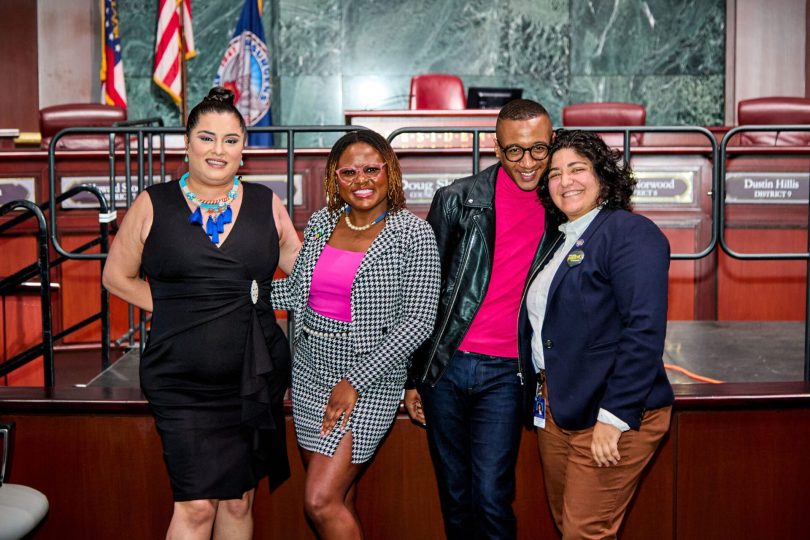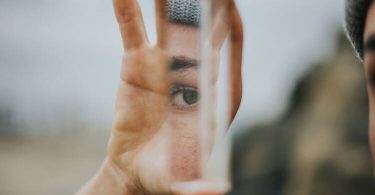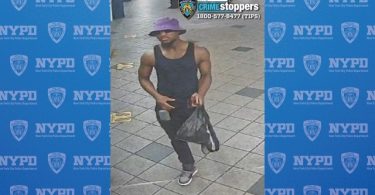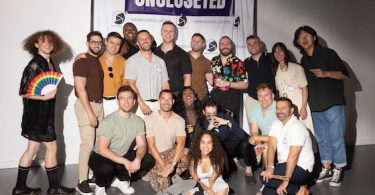As part of its education and advocacy programming across the country, the GLAAD Media Institute, GLAAD’s training, research and consulting division, convened a meeting with local leaders and community advocates in Atlanta, hosted by the City of Atlanta at Atlanta’s City Hall. Attendees who complete a program or session with the GLAAD Media Institute are immediately deemed GLAAD Media Institute Alumni, who are equipped to maximize community impact by leveraging their own story for culture change.
One of the main issues in this voting cycle for GLAAD Media Institute Alumni Rep. Park Cannon (Dis. 58) concerns Georgia voters who don’t have a permanent address. As a consequential issue, those without a permanent address may be arrested if camped out on public property, including voting locations.
The bill, HB 976, which passed the Georgia’s House and Senate was recently signed into law by Georgia Gov. Brian Kemp, indicates a revision that affects voting rights of houseless people. Specifically, the bill dictates that if a voter is houseless and without a permanent address they’ll be banned from receiving mail-in ballots and election information at shelters or alternative temporary addresses. The bill also said that houseless people will have to use the Fulton County Registrar’s Office as their address.
Rep. Park Cannon hugs Councilperson Liliana Bakhtiari outside the Council Chambers; photo by JElijah
“How does it make sense? That now you’re only eligible to vote in one type of election? If you are where you are allowed to vote, the district you can vote in is the Fulton County Government Center, but you might be staying somewhere else,” Cannon stressed to her interviewer Victor Jackson in a fireside chat discussion in April. Jackson is an Atlanta native as well as a known creative director and musical performance artist.
The artist is the creator of Mr. Glam Rock Soul Entertainment Group where he has guided “countless creatives on their journey from idea to innovation.” Jackson entered the interview with a desire to “just have a conversation” between individuals, and that’s what he did. The artist and activist who often organizes and supports GLAAD, brought Atlanta knowledge and pride into the interview. The day prior, Jackson presented a media training session to Atlanta-based LGBTQ activists, with a particular focus on HIV.
Victor Jackson sits in the City Hall of the City of Atlanta Council Chambers; photo by JElijah
Cannon, Jackson’s esteemed guest, sat side-by-side along with her close friend, City Councilperson Liliana Bakhtiari. Bakhtiari has been a sitting councilperson since 2021 and became the first queer Muslim person to be elected in the state of Georgia.
Sitting inside the Council Chambers, more than 40 people listened to Jackson interview Park and Bakhtiari as she encouraged houseless voters and those in the audience to reach out to her office to help people get their voter registration sorted out.
More than 3,000 young people in Atlanta have experienced or are currently experiencing houselessness. Of these individuals, 40% identify as LGBTQ, the Atlanta nonprofit Covenant House reports. Many of these youth are of voting age.
With that said, a recent decision by the U.S. Supreme Court ruled in City of Grants Pass v. Johnson that local governments may police houseless people camping outside on public property. The holding therefore states that the enforcement of generally applicable laws regulating camping on public property does not constitute “cruel and unusual punishment” prohibited by the Eighth Amendment.
More recently, a source close to GLAAD, who asked to be anonymous on the basis of safety and security, said that the Grants Pass decision helped ensure Atlanta’s passing of SB 62, which prohibits “hospitals, local governments, and local authorities from dropping off homeless individuals in counties other than such person’s county of residency…”
Houseless people who must make their legal address to the Fulton County Government Center might be arrested for staying overnight to vote when they don’t have a shelter to return to, or transportation back to the address listed on potential old licenses.
Aubri Escalera gets interviewed by Gabe González in the City Hall of the City of Atlanta Council; photo by JElijah
Cannon told those impacted to also contact Aubri Escalera, Legislative Aide and LGBTQ liaison for Rep. Cannon’s office as a preventative measure for safety. Escalera helped organize the two-day event and was interviewed by Gabe Gonzalez, comic, television writer, and consultant on the GLAAD Media Institute’s Spanish-Language & Latine Media team. Gonzalez is also the host of GLAAD’s original series, “Dímelo,” focused on experiences from Latine LGBTQ comics and notables in entertainment and media.
“We can directly assist because [voters] might have to register, re-register; might have to go through being told that they don’t qualify [to vote] or be kicked off or have to come in to prove their qualification,” Cannon said. Cannon’s plan is to challenge the law HB 976 before the general election.
In her conversation with Gonzalez, Escalera talked about the ways in which houseless-ness is impacted by one’s ability to prove asylum claims, documentation, and therefore, job status. The barriers increase depending on race, origin, ability, ethnicity, gender identity, gender expression and sexual orientation. Additionally, LGBTQ youth have a 120% higher risk of experiencing homelessness than non-LGBTQ youth, as reported in GLAAD’s Media Reference Guide for press.
“How can we provide a toolkit for folks who are marginalized, but also who are new arrivals, asylum seekers?” Questions Escalera. “It’s difficult. It’s difficult to be in a country when you don’t know the language. It can be difficult, but also even more difficult when you’re in a country where you know the language, but don’t have the resources.”
Aubri Escalera listens to Gabe González’s question; photo by JElijah
Escalera and Cannon are co-founders of Trans Power in Diversity, which has a mission to empower LGBTQ communities to “remain at the center instead of at the will of the margins to develop full potential to succeed in life and pursue happiness.”
The organization helps people find clothing for job interviews, safe sex resources, support groups, health and wellness support, and more.
“When you plan to make a city, you prioritize the people that are overlooked the most,” Councilperson Liliana Bakhtiari told Jackson in April. Bakhtiari has worked in war zones, helping people to escape civilian violence. They say that there are districts around the country that are worse off than those war zones. Bakhtiari used the Tenderloin District in San Francisco as an example. They said that the district needs the attention of all public officials.
However, “Atlanta is uniquely positioned,” Bakhtiari said. The councilperson said that the city has the capital, it has bipartisan support, and a neighborhood case manager pilot where a case manager works with the same community day in and day out. At the moment, Bakhtiari is working on building a state ID program for people without licenses or for those that are housing insecure. In fact, this ID can help with finding housing, food, and jobs.
Cannon, Escalera, and Bakhtiari all ask that Georgians, especially those in Greater Atlanta, reach out to them if you are a person who needs help with housing, job, food, identification, and voting information.
For more on housing programs in Atlanta, visit Atlanta Housing here.
Visit GLAAD.org/VOTE to learn more about the GLAAD Media Institute’s role in community convening and what’s at stake for the LGBTQ community at-large this election year.







